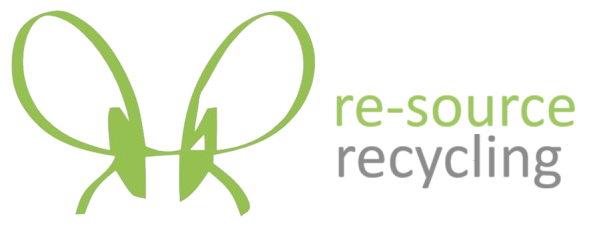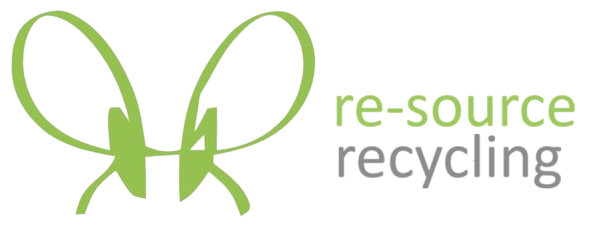
Plastic Recycling Services
Re-Source Recycling is committed to sustainable practices and environmental stewardship, offering comprehensive plastic recycling services in Toronto and beyond. With over 25+ years of expertise in the industry, we have established ourselves as a trusted leader in providing innovative recycling solutions. Our mission is to divert plastic waste from landfills, reduce environmental impact, and contribute to a circular economy.
What Types of Plastics Do We Recycle
At Re-Source Recycling, we accept a wide range of plastics for recycling, including but not limited to:
- PET (Polyethylene Terephthalate) – Commonly used in beverage bottles, food containers, and packaging.
- HDPE (High-Density Polyethylene) – Found in milk jugs, detergent bottles, and household containers.
- PVC (Polyvinyl Chloride) – Used in pipes, window frames, and packaging.
- LDPE (Low-Density Polyethylene) – Often used in plastic bags, shrink wraps, and squeeze bottles.
- PP (Polypropylene) – Found in yogurt containers, bottle caps, and food packaging.
- PS (Polystyrene) – Used in foam cups, packaging materials, and disposable cutlery.
- Others – We also recycle various other types of plastics, ensuring a comprehensive approach to plastic waste management.
Process of Plastic Recycling
Our plastic recycling process involves several key steps:
- Collection: We collect plastic waste from businesses, manufacturers, and communities across Toronto and the surrounding areas.
- Sorting: The collected plastics are sorted based on their resin type and color to ensure effective recycling.
- Cleaning: Plastics undergo thorough cleaning to remove any contaminants or residues.
- Shredding: The cleaned plastics are shredded into small flakes or granules to facilitate further processing.
- Melting and Pelletizing: The shredded plastic is melted and formed into pellets, which can be used as raw materials for manufacturing new products.
- Manufacturing: The recycled plastic pellets are then used by manufacturers to produce a wide range of products, from packaging materials to consumer goods.
Throughout the recycling process, we prioritize efficiency, quality, and environmental responsibility to ensure that the recycled plastics meet industry standards and can be used in various applications.
Best Plastics Recycling Solutions by Re-Source Recycling
At Re-Source Recycling, our dedication to environmental stewardship drives everything we do. We have developed comprehensive plastics recycling services designed to maximize the recovery and reuse of plastics, thereby minimizing landfill contributions and lowering ecological footprints. Our decades of experience mean we know the intricacies of recycling various types of plastics, ensuring that no material is wasted. Through our efforts, we contribute significantly to the circular economy by converting plastic waste into usable raw materials for new products.
Our facilities and systems are equipped to handle diverse plastic types, meeting the highest standards of quality and efficiency. From collection to processing, each step is optimized to ensure that the plastics we handle can be reincorporated into manufacturing cycles with minimal contamination. This attention to detail results in recycled plastic pellets that meet industry benchmarks, making Re-Source Recycling a reliable partner for manufacturers seeking sustainable sourcing options.
Types of Plastics Accepted for Recycling
Effective plastics recycling begins with recognizing the different resin types and their recycling potential. At Re-Source Recycling, we accept an extensive range of plastics, supporting wide-reaching waste diversion efforts. Our acceptance policy includes but is not limited to:
- PET (Polyethylene Terephthalate): Commonly used in beverage bottles and food packaging.
- HDPE (High-Density Polyethylene): Found in milk jugs, detergent containers, and household items.
- PVC (Polyvinyl Chloride): Utilized in piping, window frames, and various packaging.
- LDPE (Low-Density Polyethylene): Present in plastic bags, shrink wraps, and flexible squeeze bottles.
- PP (Polypropylene): Seen in yogurt containers, bottle caps, and food packaging.
- PS (Polystyrene): Used for foam cups, disposable cutlery, and packaging materials.
- Other specialty plastics: We accept various other plastic types to ensure comprehensive waste management solutions.
Our broad acceptance criteria help businesses and communities reduce plastic waste complexity, enabling more streamlined collection and recycling processes.
The Plastics Recycling Process
Understanding the plastics recycling process reveals why choosing an experienced recycler matters. At Re-Source Recycling, every stage is designed to optimize material recovery and maintain the highest product integrity:
Collection: We gather plastic waste from a variety of sources, including commercial businesses, industrial manufacturers, and residential communities in Toronto and surrounding areas. Reliable collection ensures plastics enter the recycling stream rather than landfills.
Sorting: Once collected, plastics are carefully sorted by resin type and color. This classification is critical because different plastics require specific recycling methods and must be kept separate to avoid contamination.
Cleaning: To guarantee the quality of recycled plastics, all materials undergo thorough cleaning to remove food residues, adhesives, and other contaminants that might interfere with processing or product safety.
Shredding: Cleaned plastics are shredded into smaller flakes or granules. This step makes the material easier to handle and prepares it for the melting process.
Melting and Pelletizing: The shredded plastic is then melted down and formed into uniform pellets. These pellets act as raw materials for manufacturers who use recycled plastics to produce new goods.
Manufacturing: Recycled plastic pellets are supplied to manufacturers producing packaging, consumer goods, automotive parts, and other products. This final stage closes the loop by reintroducing recycled content into the supply chain.
At every stage, Re-Source Recycling prioritizes environmental responsibility, regulatory compliance, and quality assurance. This holistic approach ensures that the recycled plastics are both safe and versatile.
Why Choose Re-Source Recycling?
Choosing the right plastics recycling partner can make a significant difference in environmental impact and operational efficiency. Re-Source Recycling offers unmatched expertise, tailored service options, and a transparent approach that fosters long-term collaboration.
Our deep understanding of recycling technologies, combined with decades of operational experience, positions us as an industry leader. We customize recycling solutions to suit the needs of individual businesses and municipalities, providing flexible pickup schedules, educational support, and comprehensive reporting. This partnership approach helps organizations meet sustainability goals while improving waste management practices.
Furthermore, our commitment to innovation ensures that we stay ahead of industry challenges such as fluctuating market values for scrap plastics. We actively monitor regulatory changes and adapt our services to maintain cost-effective and environmentally sound solutions. Partnering with Re-Source Recycling means investing in a future where plastics are continually recovered and reused, rather than discarded.
Benefits of Plastics Recycling
Recycling plastics delivers substantial benefits both environmentally and economically. Environmentally, plastic recycling reduces the volume of waste destined for landfills and prevents plastic pollution in ecosystems. It also conserves natural resources by lowering the demand for virgin petroleum-based raw materials, cutting down greenhouse gas emissions associated with plastic production.
Economically, using recycled plastics helps manufacturers reduce costs linked to raw material extraction and processing. It also creates jobs in collection, processing, and manufacturing sectors tied to recycling. By partnering with Re-Source Recycling, businesses and communities participate in this positive economic cycle while demonstrating corporate responsibility. Economically, using recycled plastics helps manufacturers reduce costs linked to raw material extraction and processing. It also creates jobs in collection, processing, and manufacturing sectors tied to recycling. By partnering with Re-Source Recycling, businesses and communities participate in this positive economic cycle while demonstrating corporate responsibility.
Our service model ensures that clients not only contribute to environmental protection but also benefit from efficient and cost-effective recycling solutions that support their sustainability commitments.
Join Re-Source Recycling in Building a Circular Plastics Economy
Re-Source Recycling is proud to be a leading provider of plastics recycling services, supporting Toronto and its surrounding regions in the journey toward sustainable waste management. Through comprehensive acceptance of diverse plastics, efficient processing, and collaborative client partnerships, we help transform plastic waste into valuable resources.
Choosing our plastics recycling services means committing to responsible waste diversion, reduced environmental footprint, and participation in a circular economy that benefits everyone. Together, we can create a cleaner, healthier planet for current and future generations.
FAQ about Re-Source Recycling Services
Q: What types of plastic products can I recycle with Re-Source Recycling?
A: We accept a wide range of plastic products, including bottles, containers, packaging materials, and more. Please contact us for specific inquiries about the types of plastics we recycle.
Q: How can I participate in your plastic recycling program?
A: You can participate by partnering with us as a business, organization, to responsibly dispose of your plastic waste. We offer convenient pickup services and can tailor recycling solutions to meet your needs.
Q: What happens to the plastics after they are recycled?
A: Recycled plastics are processed and transformed into raw materials for manufacturing new products, contributing to a closed-loop recycling system and reducing the demand for virgin plastics.
Q: Is plastic recycling environmentally friendly?
A: Yes, plastic recycling helps reduce the amount of plastic waste sent to landfills, conserves natural resources, and minimizes the environmental impact associated with plastic production.
Q: What types of plastics can I recycle with Re-Source Recycling?
A. We accept a wide variety of plastics including PET, HDPE, PVC, LDPE, PP, PS, and more. Contact us for detailed information about specific plastics and materials eligible for recycling.
Q: How does Re-Source Recycling collect plastic waste?
A. We offer tailored pickup services for businesses and organizations, ensuring convenient collection and efficient transport of plastic waste from your location to our processing facility.
Q: What happens to plastics after they are recycled?
A. Recycled plastics are converted into pellets that serve as raw materials for manufacturing new products, helping to close the recycling loop and reduce dependence on virgin plastic.
Q: Can plastics recycling help reduce environmental impact?
A. Yes, plastics recycling decreases landfill waste, conserves resources, lowers carbon emissions, and supports a more sustainable approach to material use.
Q: Does Re-Source Recycling accept plastic bags and films?
A. Yes, we recycle certain types of LDPE such as plastic bags and shrink wraps, but it’s best to verify specific items with our team to ensure eligibility.
Q: How can my business start working with Re-Source Recycling?
A. Simply contact us to discuss your plastic waste needs. We’ll develop a customized recycling plan and schedule pickup or drop-off options suited to your operations.
Q: Is recycled plastic quality reliable for manufacturing?
A. Absolutely. Our process ensures recycled plastic pellets meet industry standards and are suitable for a wide range of manufacturing applications.
Partner with Re-Source Recycling today to make a positive impact on the environment and embrace sustainable plastic waste management practices. Together, we can work towards a greener, more sustainable future
China’s Green Fence
Recent actions by the Chinese government have created significant challenges for North American plastics recyclers and exporters. These actions have caused a significant drop in the value of scrap plastic.


